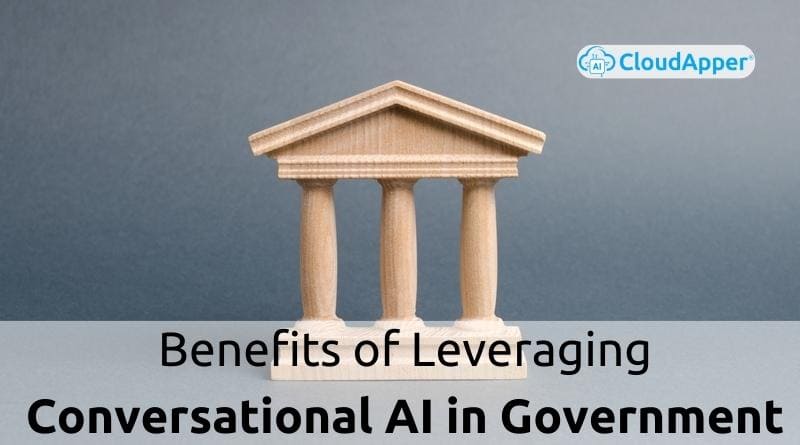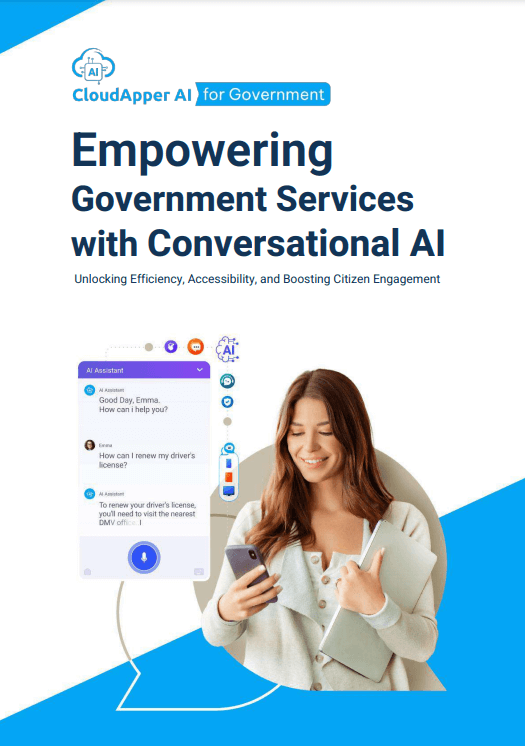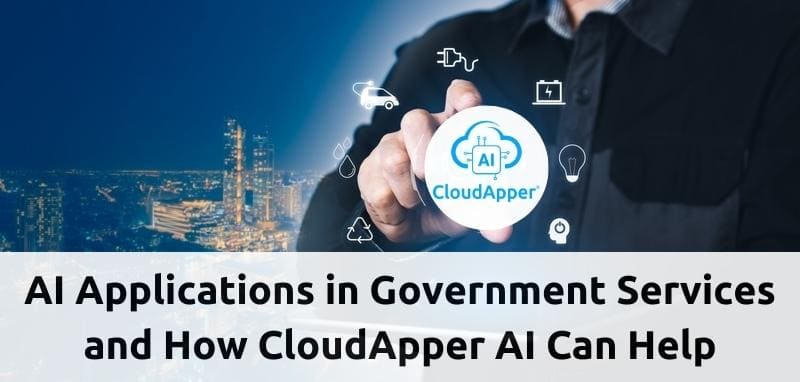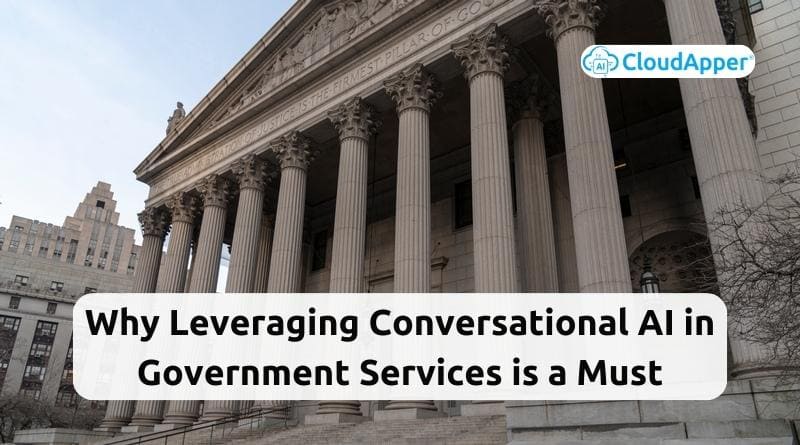Table of Contents
In an era filled with rapid technological advancements, industries and organizations worldwide are slowly but surely realizing the immense benefits of harnessing the power of AI. Conversational AI, in particular, is helping automate processes, remove complexities, and save significant amounts of time by rapidly processing large sets of information. However, AI is not only for organizations – governments can also adopt and leverage AI. For instance, implementing conversational AI in government services can easily streamline operations, enhance citizen services, and ensure a more responsive government agency.
Let’s take a look at how AI is being implemented across industries, how CloudApper AI can be utilized by government agencies efficiently, some use cases, benefits, and more.
The Rise of Conversational AI Across Industries
Industries ranging from healthcare to finance have implemented conversational AI to automate routine tasks, improve service, reduce administrative burden, and increase operational efficiency. Organizations are witnessing the transformative impact of AI on workflows, allowing employees to focus on high-impact tasks while delegating repetitive processes to AI-powered solutions. Conversational AI, with its natural language processing capabilities, is creating a paradigm shift in how businesses operate, adapt, and serve their clients.
But what about conversational AI in government agencies?
Conversational AI in Government Agencies
As industries leverage conversational AI to drive automation and efficiency, government agencies can similarly benefit from CloudApper’s conversational AI solution.
The CloudApper AI platform is designed to seamlessly integrate with any existing system, offering custom, robust AI-powered solutions for automating and optimizing government operations. This means that the transition to AI-driven processes doesn’t require a complete overhaul of existing systems, ensuring a smooth and cost-effective implementation for governments. To put it shortly, government agencies can easily adopt and implement AI into their existing systems and operations.
While that shows that utilizing AI for government agencies is possible and easy, let’s look at a few use cases showing how conversational AI can help governments streamline services.
Use Cases of Conversational AI in Government Services
Conversational AI transforms the way government agencies interact with citizens and streamline processes – here are some use cases:
Citizen Support
Conversational AI can answer questions about government services, laws, and other FAQs, offering citizens a reliable, 24/7 support system.
Online Forms Assistance
Guide citizens through the completion of online forms, reducing errors and streamlining the application process for various services.
Feedback and Surveys
Collect valuable feedback from citizens to improve government services and gauge public sentiment on different policies and initiatives.
Incident Reporting
Enable citizens to report accidents, incidents, or issues through the AI assistant, facilitating a quicker response from government authorities.
Access to Public Information
Conversational AI acts as a digital assistant and provides easy access to public information, ensuring transparency and accessibility.
Employee Support
Government employees can access information related to government policies, streamlining internal communication and knowledge sharing.
File Complaint
Citizens can easily file complaints regarding various issues through the AI Assistant, enhancing the government’s ability to address public concerns.
Request Public Service
Enable citizens to efficiently request public services or emergency assistance through the AI assistant.
Make Appointments
Citizens can make reservations and manage appointments effortlessly, enhancing the overall service experience.
Based on the use cases, let’s take a look at what benefits conversational AI provides to government agencies.
Benefits of Conversational AI in Government
Enhanced Citizen Experience
Conversational AI makes government support accessible 24/7, empowering citizens to find information and solutions conveniently. The frustration of navigating complex government portals and limited office hours becomes a thing of the past.
Operational Efficiency
By automating routine tasks, answering citizen inquiries around the clock, and providing instant access to critical information, conversational AI allows government officials to focus on high-impact tasks – enhancing the overall operational efficiency of the agency.
Time and Resource Savings
Automating processes that were once manual and time-consuming translates to significant time and resource savings for government agencies. Repetitive tasks can be handled efficiently, freeing human resources for more strategic initiatives.
Data-Driven Decision Making
Conversational AI generates valuable data from citizen interactions. Analyzing this data provides insights into citizen behavior, preferences, and needs, enabling data-driven decision-making for government agencies to improve services.
Flexibility and Adaptability
CloudApper AI’s flexibility allows government agencies to adapt and evolve with changing needs. The solution can be customized to cater to specific requirements, ensuring a tailored approach to conversational AI implementation.
Why Government Agencies Should Leverage Conversational AI
While organizations are adopting and leveraging AI to improve processes significantly, government agencies cannot afford to lag behind if they want to serve citizens better. Here’s why government agencies should utilize conversational AI:
Meeting Citizen Expectations
With the digital landscape evolving rapidly, citizens expect seamless and accessible interactions with government agencies as well. Conversational AI meets these expectations by providing instant, user-friendly support.
Efficiency Gains
Conversational AI automates tasks that are traditionally time-consuming and resource-intensive. This results in efficiency gains, allowing government agencies to focus on strategic initiatives and improve overall service delivery.
Enhanced Transparency
Providing citizens with easy access to information fosters transparency in government operations. Conversational AI acts as a bridge, ensuring that citizens have the information they need to make informed decisions.
Adaptation to Changing Technologies
Embracing AI solutions positions government agencies to adapt to changing technologies and stay relevant in a fast-paced digital landscape. It future-proofs operations, ensuring the ability to meet evolving citizen needs.
Utilize Conversational AI Now for Government Authorities
Conversational AI in government is not just a technological advancement; it’s a catalyst for a more efficient, transparent, and citizen-centric governance model. CloudApper AI’s comprehensive solution empowers government agencies to embrace this transformation seamlessly, providing a blueprint for improved services and operational excellence. As we enter the future, integrating conversational AI in government services is not just a choice; it’s a strategic imperative for those committed to meeting the evolving needs of citizens in the digital age. Contact CloudApper AI now to learn how we can help streamline government services by easily utilizing AI.
What is CloudApper AI Platform?
CloudApper AI is an advanced platform that enables organizations to integrate AI into their existing enterprise systems effortlessly, without the need for technical expertise, costly development, or upgrading the underlying infrastructure. By transforming legacy systems into AI-capable solutions, CloudApper allows companies to harness the power of Generative AI quickly and efficiently. This approach has been successfully implemented with leading systems like UKG, Workday, Oracle, Paradox, Amazon AWS Bedrock and can be applied across various industries, helping businesses enhance productivity, automate processes, and gain deeper insights without the usual complexities. With CloudApper AI, you can start experiencing the transformative benefits of AI today. Learn More




















